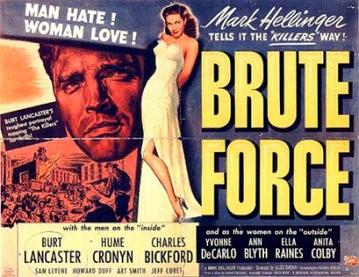Brute Force

A 1947 release, Brute Force, directed by Jules Dassin, is a tense, no-nonsense prison drama. The prison genre was a common one from the beginning of films, as we learn in the interview done with a criminologist, featured in the extras on the Criterion Collection disc. In the 1930s alone there were over 70 prison films, but not so many after World War II (they morphed into the prisoner-of-war film). Commonly, films featuring prisoners as antagonists were allegories for society at large, as there's not much an audience member likes to see more than someone sticking it to the system, and a prisoner vs. a sadistic guard or warden is one of the easier forms for this to take (perhaps the most recent example is The Shawshank Redemption).
The difference between The Shawshank Redemption and Brute Force, though, is that there is nothing innocent about the prisoners in Brute Force, whereas Tim Robbins was an innocent man in the former. They are, though, gulity of mostly non-violent crimes. The focus is on a group of prisoners in one cell. We get a glimpse of most of them when they were on the outside. One is a mild-mannered accountant who cooked books so he could buy his wife a fur coat. Another was a soldier who ended up killing a civilian in Italy, another is a stock market swindler. Burt Lancaster is their leader, who was a hood but fell in love with a handicapped girl who knows nothing about his life of crime. He wants to get out of the stir so he can be with her when she has an operation.
The antagonist in this picture is a guard, played by Hume Cronyn, and what an antagonist. Cronyn gives a terrific performance of pure sadistic evil. He's quietly menacing--never raising his voice, a meek countenance, but he rules the yard with an iron hand. While he kisses up to a visiting politician who is putting pressure on the spineless warden (Cronyn wants his job) he is also not above planting weapons on prisoners, sending sick ones to work on the "drainpipe," where they will surely die, or giving false information about loved ones to prisoners (in one case this leads to a suicide). The kindly prison doctor, who spends most of his day soused, sums it up when he tells him to his face that he gets drunk on power, and that he doesn't use intelligence or imagination to rise to the top, he merely uses brute force. His most chillin scene is when he turns up the volume on a Victrola playing classical music while he beats a prisoner with a hose to get information out of him. The other guards, cowed by him, listen anxiously outside his office, playing cards and dreading what they have become.
Most of the film follows Lancaster and his comrades planning a breakout, and the last third of the film or so is a white-knuckled playing out of the plan, of course ending with a direct confrontation between Lancaster and Cronyn.
This is a first-rate film, well written, directed, photographed and acted. Look for Yvonne DeCarlo, TV's Lily Munster, in a small role as an Italian woman.


Comments
Post a Comment